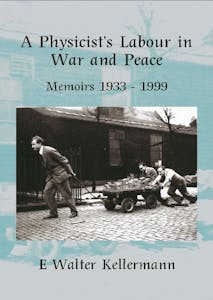This book is of interest to historians of science and to scientists as well as to the general reader. Historians will be interested in the author's 'revealing view' of the British pre war university system, the establishment of Theoretical Physics as a new discipline in Britain and his commitment to preserve science during the funding battles of the Thatcher years. Physicists will find a clear introduction to the research into one of the greatest puzzles in astrophysics namely the enormous energies created in our cosmos manifested by [ Auger's discovery ] of the 'Grandes Gerbes', the showers of particles currently incident on the earth now investigated by a major international cooperation.
The book. is 'a great combination of autobiography and history of the sciences during a long and exciting period of History' (Stefan Sienell, Atistrian Academy of Sciences), 'A very, important source of reference' (Professor John Dainton, Liverpool University). 'The book has authority and relevance' (Jeff Hughes, Manchester University), 'Perceptive assessments of contemporary events' (Geoffrey Cantor, Professor of the History of Science, Leeds University).
His research in Edinburgh with the future Nobel Laureate Max Born, one of the giants of Theoretical Physics, led to a breakthrough in solid-state physics. In Manchester he worked with Patrick Blackett, also a future Nobel Laureate, measuring ‘Extensive Air Showers’. These are sprays of particles, which fall on the earth generated by nuclear particles from the cosmos. Later in Leeds he was one of the initiators of the National British Air Shower Experiment. - He writes about some of the famous scientists he has met, and also of his disappointments which are often the fate of a working scientist.
Reviews
From Cern Counter Book Shelf
Kellermann's account makes fascinating reading, describing the aspirations and frustrations of a physicist who was not centre stage, but moved among a cast of famous names. These included not only Born and Blackett, but also Klaus Fuchs, best known as a spy. The book also presents a revealing view of the British university system, with some alarming examples of racism, in particular in the 1930s and 1940s when departments were keen to keep down the number of refugees.
Christine Sutton, CERN.
These intelligently written memoirs (Professor Geoffrey Cantor, University of Leeds) offer perceptive assessments of contemporary events and of many of the scientists and politicians Kellermann encountered.
The Leitmotiv during Kellermanns later years was his research on cosmic ray extensive air showers. The non-specialist will find a clear account of how these showers, caused by enormously energetic particles from the cosmos are clues to its understanding, an account leading right up to the present state of the art.
